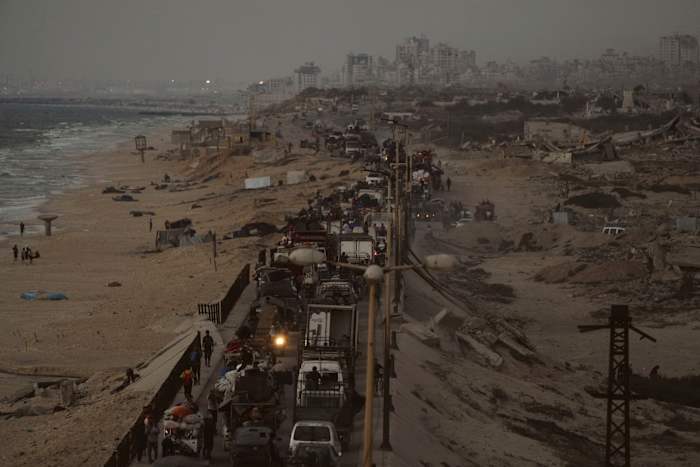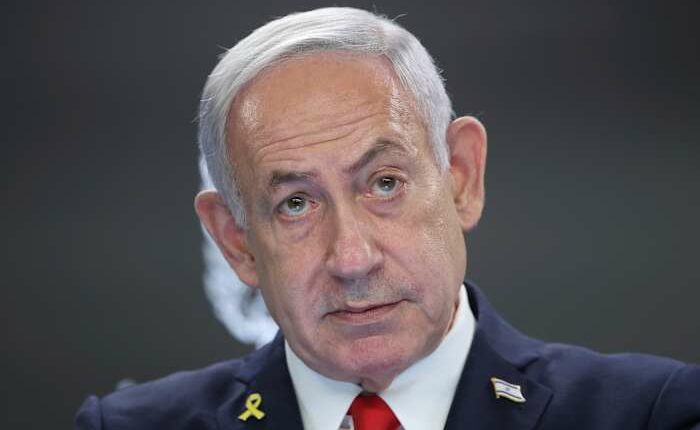Share this @internewscast.com

JERUSALEM – Prime Minister Benjamin Netanyahu’s decision to attempt an assassination of Hamas leaders in Qatar this week was a significant risk in his ongoing efforts to subdue the organization.
With signs growing that the mission failed, that gamble appears to have backfired.
Netanyahu intended to eliminate top exiled leaders of Hamas to edge closer to his goal of defeating the militant faction, responsible for the attack on Israel on October 7, 2023, and force them into capitulation after almost two years of conflict in the Gaza Strip.
However, Hamas stated their leaders managed to survive the attack, and Netanyahu’s international reputation, already eroded by the devastation and crisis in Gaza, was further damaged.
The strike on Tuesday provoked outrage from Qatar, a vital U.S. ally and key intermediary in the conflict, and attracted criticism from the broader Arab region. It has also complicated ties with the U.S. government and disrupted ceasefire negotiations, potentially risking the lives of around 20 hostages still believed to be held in Gaza.
Despite this setback, Netanyahu remains undeterred, continuing the war effort. With his hard-line coalition providing strong support, there is no immediate challenge to his leadership.
Netanyahu’s hope for an ‘image of victory’ for his government
The attack resulted in the deaths of five lower-level Hamas operatives and a Qatari security guard. Though Hamas reported that senior leaders, who were convening to evaluate a new U.S. ceasefire initiative, escaped unharmed, they have not provided photographic evidence, and Qatar has remained silent on their status.
If the airstrike had killed the top leadership, the attack could have provided Netanyahu an opportunity declare Hamas’ destruction, said Harel Chorev, an expert on Arab affairs at Tel Aviv University.
“It’s all very symbolic and it’s definitely part of the thing which allows Netanyahu at a certain point to say ‘We won, we killed them all,’” he said.
Israel’s fierce 23-month offensive in Gaza has wiped out all of Hamas’ top leadership inside the territory. But Netanyahu has set out to eradicate the group as part of his goal of “total victory.”
That is now looking increasingly unlikely, making it even harder for Netanyahu to push a ceasefire through his hard-line coalition.
Far-right members of Israel’s governing coalition have cornered Netanyahu, threatening to topple his government unless Israel pushes ahead with an expanded operation in Gaza City, despite serious misgivings by many in the military leadership and widespread opposition among Israel’s public.
A successful operation in Qatar could have allowed Netanyahu to placate the hard-liners, even though it would have eliminated the very officials responsible for negotiating a possible ceasefire.
Burning the channel with Qatar
Israel has had the ability to target Hamas leaders in Doha from the start of the war but did not want to antagonize the Qataris while negotiations took place, Chorev said.
Qatar has helped negotiate two previous ceasefires that have released 148 hostages, including eight bodies, in exchange for thousands of Palestinian prisoners. Israel’s military has rescued just eight hostages alive, and retrieved the bodies of 51 hostages.
While Israel has complained that Qatar was not putting pressure on Hamas, it had continued to leave that channel open — until Tuesday.
“Israel, by the attack, notified the whole world that it gave up on the negotiations,” Chorev said. “They’ve decided to burn the channel with Qatar.”
Asked if ceasefire talks would continue, Qatar’s prime minister, Sheikh Mohammed bin Abdulrahman Al Thani said that after the strike, “I don’t think there’s anything valid” in the current talks. But he did not elaborate and stopped short of saying Qatar would end its mediation efforts.
How Netanyahu hopes to win the release of the remaining hostages remains unclear.
On Thursday, Sheikh Mohammed accused Israel of abandoning the hostages.
“Extremists that rule Israel today do not care about the hostages — otherwise, how do we justify the timing of this attack?” Sheikh Mohammed told the U.N. Security Council.
Nonetheless, he said his country was ready to resume its mediation without giving any indication of next steps. On Friday, Sheikh Mohammed met in Washington with U.S. Secretary of State Marco Rubio, who was scheduled to visit Israel this weekend in a sign of how the Trump administration is trying to balance relations between key Middle East allies.
Straining ties with the US
Netanyahu, who has received ironclad support from the U.S. since President Donald Trump returned to office, appears to have strained ties with his most important ally.
Trump said he was “very unhappy” about the airstrike and assured the Qataris such an attack would not happen again.
Trump, however, has not said whether he would take any punitive action against Israel or indicated that he will pressure Netanyahu to halt the war.
Netanyahu, in the meantime, remains undeterred and threatened additional action if Qatar continues to host the Hamas leadership.
The message to Hamas is clear, he said Thursday: “There is no place where we cannot reach you.”
Little impact on the war in Gaza
Israel is pressing ahead with its expanded offensive aimed at conquering Gaza City. The military has urged a full evacuation of the area holding around 1 million people ahead of an expected invasion.
“Netanyahu’s government is adamant to go on with the military operation in Gaza,” said Gayil Talshir, a political scientist at Hebrew University in Jerusalem.
Israel has brushed off calls to halt the war from the United Nations, the European Union and a growing number of major Western countries who plan to recognize a Palestinian state at the U.N. Security Council later this month, she said.
The only one who might be able to change this trajectory is Trump, she added, by telling Israel “enough is enough.”
Netanyahu’s political future unthreatened
If Hamas’ leaders survived, and the negotiations collapse, Netanyahu will further alienate the roughly two-thirds of the Israeli public who want an end to the war and a deal to bring home the hostages.
But that opposition has been in place for months, with little influence on Netanyahu.
“Netanyahu’s future in the near term doesn’t depend on the Israeli public,” said Yohanan Plesner, president of the Israel Democracy Institute, a Jerusalem think tank.
Instead, his political survival depends on his governing coalition, many of whom have expressed wholehearted support for the assassination attempt.
This has sparked panic and more suffering for the families of the hostages still held in Gaza.
Einav Zangauker, whose son, Matan, is among the captives, said this week she was “shaking with fear” after hearing about Israel’s attack in Doha.
“Why does the prime minister insist on blowing up every chance for a deal?” she asked, on the verge of tears. “Why?”
Copyright 2025 The Associated Press. All rights reserved. This material may not be published, broadcast, rewritten or redistributed without permission.










